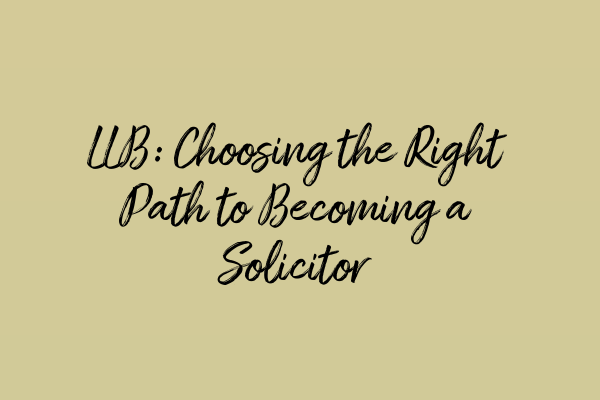Choosing the Right Path to Becoming a Solicitor
If you have a passion for law and a drive to serve justice, pursuing a career as a solicitor may be the perfect path for you. However, entering the legal profession requires dedication, perseverance, and a solid educational foundation. One of the essential steps in this journey is obtaining an LLB degree. In this blog post, we will explore the key aspects of pursuing an LLB and guide you in choosing the right path to becoming a solicitor.
Why Choose an LLB?
The Bachelor of Laws (LLB) is a prestigious degree that serves as a gateway to a legal career. Pursuing an LLB not only enriches your knowledge of legal principles and concepts but also equips you with practical, analytical, and critical thinking skills that are essential for success in the legal profession.
The LLB degree provides a well-rounded education in law, covering core subjects like contract law, criminal law, constitutional law, and more. It lays the foundation for understanding the legal system and its intricacies. The knowledge and skills gained through an LLB program will shape your legal acumen and prepare you for professional training.
Choosing the Right University
Selecting the right university for your LLB is crucial as it will greatly influence the quality of your legal education and future prospects. Here are some key factors to consider when making this decision:
1. Accreditation: Ensure that the university and its LLB program are recognized and accredited by the Solicitors Regulation Authority (SRA) or the relevant regulatory body in your country. This ensures that the program meets the necessary standards and requirements.
2. Reputation: Research the reputation of the university and its law school. Consider factors such as rankings, faculty expertise, connections with the legal community, and student feedback.
3. Curriculum: Review the LLB curriculum offered by the university. Look for a well-rounded program that covers a wide range of legal subjects, including core areas and specialized areas of interest such as corporate law, international law, or human rights law.
4. Opportunities for Practical Experience: A strong practical component is vital for developing legal skills and gaining practical experience. Investigate whether the university offers clinical legal education, legal internships, or opportunities to participate in moot court competitions. These experiences can enhance your employability and provide valuable insights into the real-world practice of law.
5. Alumni Network: Consider the strength and reach of the university’s alumni network. A vast and influential network can open doors to internships, training contracts, and job opportunities in reputable law firms.
Pathways to Qualification
Once you have completed your LLB, there are specific pathways you need to follow to become a qualified solicitor. The currently available pathways are:
1. Traditional Pathway: Under the traditional pathway, after completing your LLB degree, you will need to undertake the Legal Practice Course (LPC). The LPC provides practical training in core legal skills such as interviewing, research, drafting, and advocacy. Upon completion of the LPC, you must secure a training contract with a law firm or organization accredited by the SRA. The training contract is typically a two-year period of supervised work experience.
2. Solicitor Apprenticeship: The solicitor apprenticeship route allows individuals to become a solicitor while working and studying part-time, without the need for a university degree. This pathway combines work-based learning, such as working in a law firm, with studying part-time. Apprentices can qualify as solicitors through an integrated degree apprenticeship or a non-integrated apprenticeship.
3. Equivalent Means: If you have gained legal knowledge and experience through other pathways, such as working as a legal executive or holding a foreign law degree, you may be eligible for qualification as a solicitor through the Equivalent Means route. This requires demonstrating that you have the necessary skills, knowledge, and experience to meet the SRA’s standards.
It is important to note that these pathways may evolve over time, and it is advisable to consult the SRA or a legal professional for the most up-to-date information.
Choosing the right path to become a solicitor is a crucial decision. Consider your personal circumstances, career goals, and preferred mode of study when making this choice. Seek guidance from qualified professionals, such as career advisors, solicitors, or university representatives, who can provide valuable insights and help you make an informed decision.
Conclusion
Pursuing an LLB is a significant step towards a successful career as a solicitor. It not only provides a solid foundation in law but also opens up various pathways to qualification. By carefully selecting the right university, following the appropriate pathway, and seeking guidance from professionals along the way, you can embark on a rewarding journey towards becoming a solicitor.


Leave a Reply